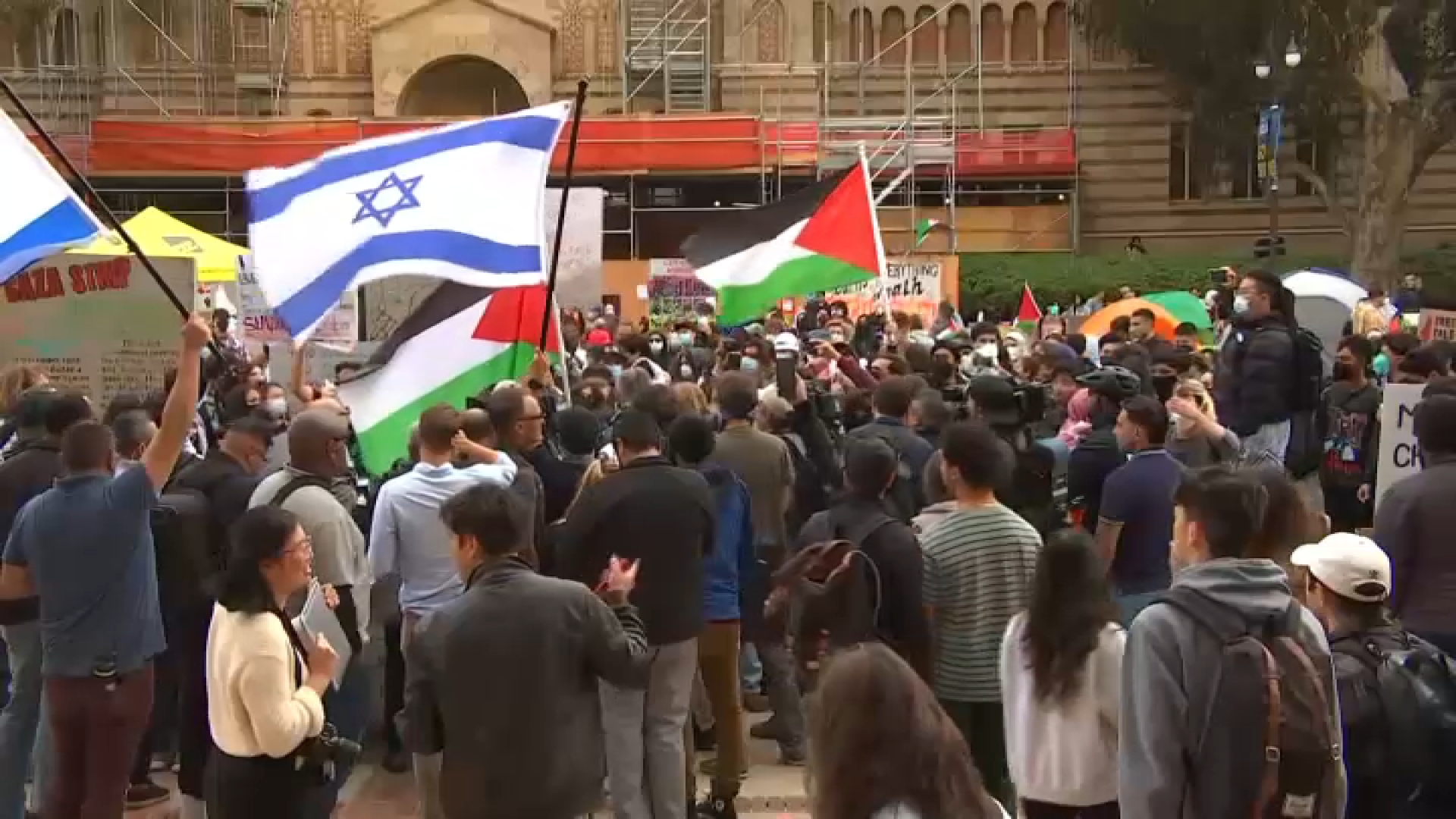Despite vocal public calls for defunding, the Los Angeles Unified School District Board of Education Tuesday night rejected a proposal that would have slashed 90% of the School Police Department's budget by 2024.
The proposal by board member Monica Garcia called for the School Police budget to be reduced by 50% in the 2021-22 fiscal year, then 75% the next year and 90% the following year, with funds redirected to the "highest need schools in support of African-American students."
Some board members, however, said they were reluctant to take such a drastic action without an alternative plan in place to guarantee the safety of students in the nation's second-largest school district.
"I would regret for the rest of my life if I left any student vulnerable, any student in danger," board member Richard Vladovic said.
The vote came at the end of a marathon board meeting that began at 9 a.m. with several hours of public testimony. The final board votes on a trio or resolutions addressing school policing weren't cast until 8:30 p.m.
In the end, the board rejected all three of the resolutions, unable to reach consensus on any of them. The most dramatic of the proposal was Garcia's, which called for the dramatic reduction in school police funding.
Garcia said the district and its police officers are doing the best they can, but it's not good enough.
Local
Get Los Angeles's latest local news on crime, entertainment, weather, schools, cost of living and more. Here's your go-to source for today's LA news.
"This is about systemic racism and classism," Garcia said, stating that the issue is not about any one police officer but about a bigger picture safety strategy and issue of children of color falling behind academically for multiple reasons and she is ready to reallocate resources to address that.
She noted that for all students in the district, 36% are below average but 46% of Black students are below average; additionally, 20% of all students in the district are above average, while 13% of Black students are above average.
"Today calls on us to do something more," she said, noting that there's much work to be done to interrupt perpetual racism: "I don't fool myself for one minute that this is the solution to everything."
Board member George McKenna, however, delivered an impassioned defense of school police, and warned the board against taking a knee-jerk vote in response to a growing national movement to eliminate or dramatically reduce law enforcement. Calls for defunding police have been escalating since the death of George Floyd during his arrest by police in Minneapolis.
"We're caught up in the emotion of the moment in America," he said.
Board member Scott Schmerelson echoed that sentiment, saying public safety on school campuses does need rethinking, but he could not support a mass
defunding of the school police.
"We all want change. We all want reform,'' he said. "But to get rid of school police? No."
Only Garcia and board member Nick Melvoin supported Garcia's motion, which failed on a 2-4 vote, with board member Kelly Gonez abstaining.
On 4-3 votes, the board also rejected two other resolutions relating to school policing.
Board member Jackie Goldberg's proposal called for the creation of a Reimagining School Safety Action Planning Group to make recommendations to the board no later than July 30. The motion also would have made some operational changes to the school police department, including elimination of military-style uniforms for officers and a mandate that officers patrol outside school grounds, not on campus.
Another option, proposed by McKenna, would have created another committee to study the roles of police at schools.
"I think school police are being unfairly demonized," McKenna said.
LAUSD Superintendent Austin Beutner said last week a district-wide budget review this summer will include a deep look at the Los Angeles School Police Department, which was founded in 1984 and employs 366 sworn officers and 95 non-sworn officers. Its budget of roughly $70 million represents less than 1% of the district's annual budget.
Beutner has appointed a nine-member task force, which includes himself as well as educators, former public defenders and prosecutors, and public policy experts. The task force plans to deliver a progress report and initial recommendations to the Board of Education sometime in August.
Regardless of what the task force ultimately recommends regarding school police, Beutner said ``random wanding'' searches will stop as of July 1, and he is recommending the elimination of officers' use of pepper spray and carotid holds. Pepper spray was used four times last year by officers at LAUSD, but Beutner said choke holds have not been used for as long as he can remember.
More than 50 speakers addressed board members during the first two hours of the district's Board of Education marathon meeting Tuesday, and another 100 were still in the queue before the allotted time ran out. Most comments were submitted via phone, but a few people were socially distanced in the board room, where the only board member attending in person was Garcia -- other board members participated via video chat.
The majority of public comments called for the total elimination of school police or supported Garcia's proposal to slash the school police budget.
But others spoke on behalf of maintaining a police force to protect the safety of students and staff.
The California Charter Schools Association and leaders representing the two largest Los Angeles Unified unions, representing teachers and classified workers, voiced their support of Garcia's proposal.
Advocates for defunding police pushed for the money to instead be allocated to increased mental health services, school nurses, teachers and other support for students. Some argued there might be fewer crimes at schools if students' basic needs were being met.
Anna Garcia, an educator for an arts organization that works with local schools, called campus police ``absurd'' and said, "We need teachers. We don't need police officers."
Hamilton High freshman Amara Abdullah, co-founder of the Black Lives Matter-Los Angeles Youth Vanguard, said school police make students feel uncomfortable.
"You can't expect us to do as well in school as white students if we feel criminalized every time we walk into campus," she said.
Activists who support total elimination of school police contend that Black youth represent less than 9% of the district's student body but account for a quarter of all arrests, a statistic reported by the Million Dollar Hoods Project at UCLA.
The other side of the emotionally charged argument included many parents and some teachers, as well as several school police officers and students involved in the Police Explorers program. People wearing "I heart LASPD" shirts shared personal stories of officers saving lives. They argued that officers are needed to maintain safety, especially against the threat of mass shootings.
Senior Police Officer Richard Bryant, who is a local pastor, said he's personally risked his life for student victims of gang violence and knows other officers have done the same. He said students at his school know how much he cares about them, and they need him.
"I hear a lot of people saying they've been bullied by school police, and I'm saying that's not true,'' Bryant said, recalling several violent incidents to which he responded to protect students and staff. "The school police officers, as well as myself, risk their lives out there on the streets. They care about the community, and I know that for a fact."
Henry Anderson, a parent, grandparent and school officer for 25 years, said he's not on the job to "brutalize and terrorize" students -- his voice cracking as he spoke against those claims, stating ``that's not what we do.'' He said he is proud to put his uniform on every day to take care of students.
"To defund us is not the answer," Anderson said simply.
LAUSD police -- who are not part of the Los Angeles Police Department -- responded to more than 100,000 emergency calls last year, including threats of mass shootings and bombs at schools, as well as robberies, sexual assaults, burglaries and other serious crimes, advocates told the board.



